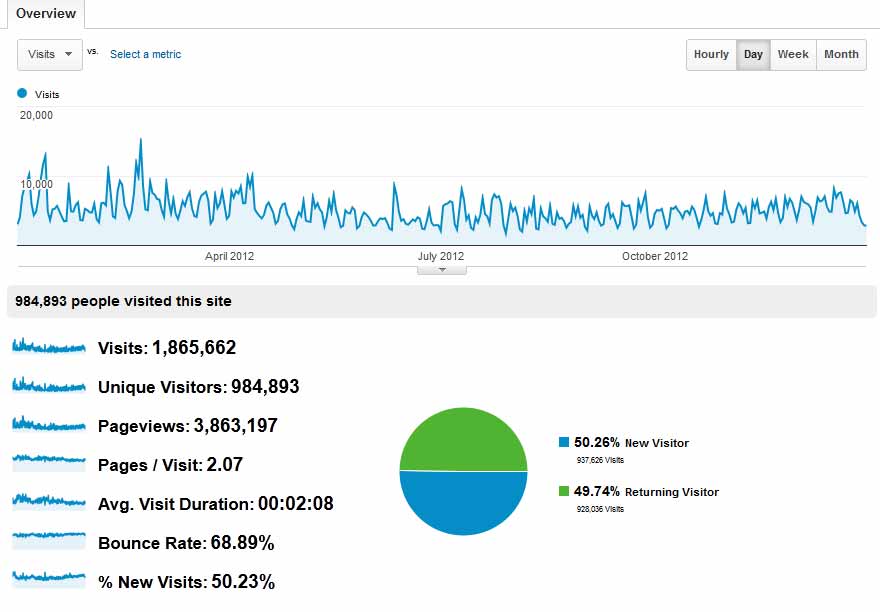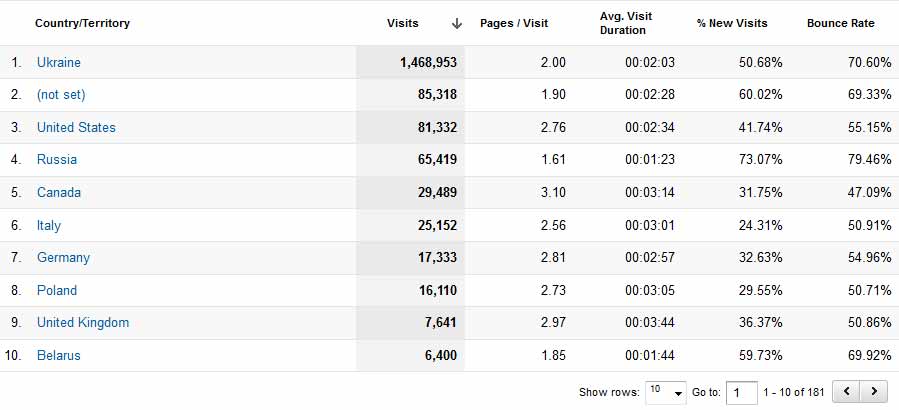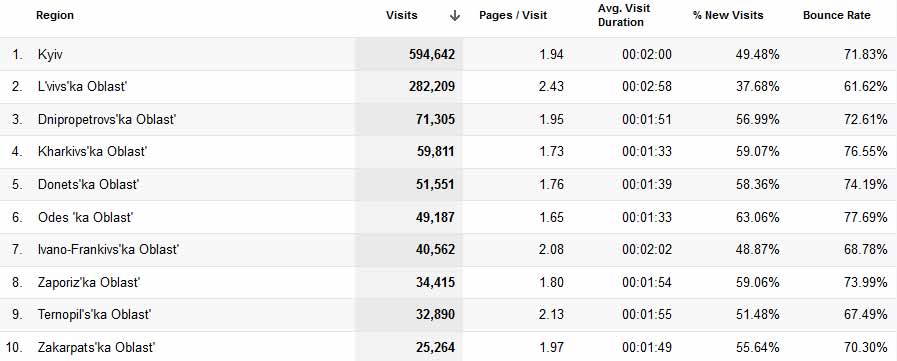2012 in the Life of the RISU Editorial Office
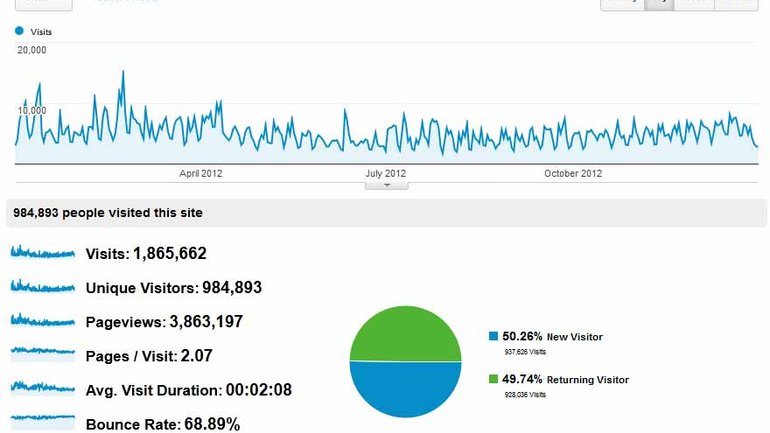
The year 2012 has ended; it was rich in various events and developments. For the editorial office of RISU, it was a special year of challenges and changes.
What We Did
In 2012 on the Ukrainian version of RISU appeared 2,987 news articles (an average of over 8 news daily, including all weekends and holidays) and more than 3,000 in the Russian and English versions. Furthermore, there were 94 “Exclusive” articles, 98 “Expert Opinion” pieces, and 9 “Religious Studies” articles. Our bloggers produced 304 posts. Our sections “Resources” and “Religions in Ukraine” were significantly updated. And dozens of new texts were posted on subportals “Religious Tourism,” “RISU’s Electronic Library” and “Theology Portal.”
This year RISU completed a traditional project monitoring religious freedom and started a new project by presenting a dialogue between religions and nations in Ukraine.
In addition to the daily editorial work, the RISU team in May in Lviv organized the second phase of the conference “The Church in the Information Society,” which attracted about 200 participants and about 30 speakers.
Also, throughout the year the editorial staff participated in a number of diverse conferences, including as speakers. In particular, RISU director Taras Antoshevskyy spoke at an international conference on religious freedom in the world (Provo, USA), and with colleagues from the Institute for Religious Freedom presented on Ukraine’s situation in this field. He also had several meetings with representatives of the Ukrainian diaspora in the United States and experts from governmental human rights institutions. RISU editor Anatoliy Babynskyi spoke at the conference “The challenges from new information technologies to mainstream media” (Kyiv, September) on the topic “The Church, Media and Society in Ukraine.” PR specialist Olena Kulyhina spoke at several international conferences on the cooperation of the church and the media.
RISU was a media partner at several events, including: the Interreligious Prayer for Christian Unity, the International Publishers' Forum in Lviv, the Fifth Ecumenical Social Week, National Prayer for Orphans, and others.
At the end of the year the manual “The Church and Media: Seven Steps to Understanding,” prepared by the editorial staff of RISU together with colleagues from the periodicals Credo and Kana, was released.
What We Achieved
According to statistics from Google, as a whole during 2012 the RISU portal (except the old version of RISU and the Theology Portal) was visited by almost a million unique visitors (see Table 1), half of them new. More than 3.8 million pages were opened.
News, articles, and popular texts were of most interest among readers. Among the news many readers read information about internal church life (events in the UOC-MP) at the beginning of 2012, the nomination of Fr. Borys Gudziak as bishop), church-state and religious and political events. Also there was continuing interest among readers in information about miraculous events, holidays, church-related scandals. Peak attendance was on February 23 with 14,832 visitors (an all-time record for RISU) and the biggest (almost 7.5 thousand) hit on this day was the Russian-language news commentary of the then manager of the UOC-MP Bishop Mytrofan on the reasons of the dismissal of Archbishop Oleksandr (Drabynko). It is worth noting that during these days the Russian version of RISU in terms of number of readers surpassed the Ukrainian version, and geographically the number of visits from Odesa and Russia significantly increased.
Other materials that are typically popular are articles about religious holidays and traditions, texts of Christmas carols and religious poetry, as well as materials on important social issues.
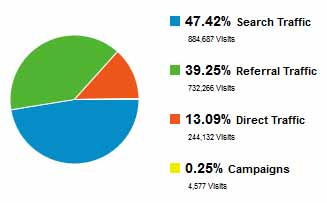 RISU’s traffic sources (Table 2) from year to year do not significantly change. Almost half of the people come to us through search engines (47.42%) or other sites (39.25%). Direct traffic decreased to 13.09% (in 2011 it was more than 19%), which is associated with the increase in number of visits from search engines. Interestingly, the clear leaders in search words are words “risu” (in Ukrainian too) or even “risu.org.ua,” indicating that visitors are searching for the RISU portal, but either do not know / do not remember the exact web address or they type it in the search browser. And thus they come to our portal through search engines.
RISU’s traffic sources (Table 2) from year to year do not significantly change. Almost half of the people come to us through search engines (47.42%) or other sites (39.25%). Direct traffic decreased to 13.09% (in 2011 it was more than 19%), which is associated with the increase in number of visits from search engines. Interestingly, the clear leaders in search words are words “risu” (in Ukrainian too) or even “risu.org.ua,” indicating that visitors are searching for the RISU portal, but either do not know / do not remember the exact web address or they type it in the search browser. And thus they come to our portal through search engines.
By geography (Tables 3-5) readers from Ukraine clearly dominated, then from the United States, Russia, Canada, Italy, Germany, Poland, Great Britain and Belarus – a total of 181 countries.
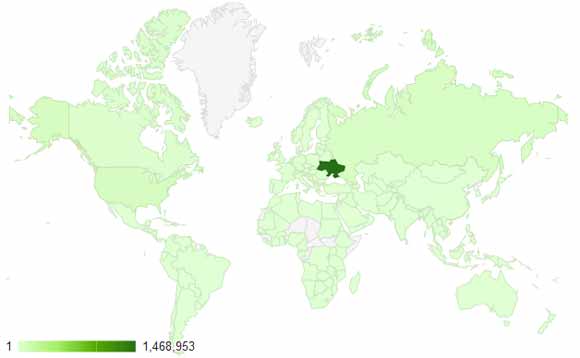
Among the regions of Ukraine, Kyiv is the undisputed leader, followed by the Lviv, Dnipropetrovsk, Kharkiv, Donetsk, and Odesa regions. Kyiv and Lviv are the traditional leaders, but the order of other regions varies depending on the content: if attention is focused on events in a particular region or religious institution immediately there is a growth in visits from this or neighboring regions (such as the above-mentioned developments in the UOC). We hope that the growing number of exclusive RISU materials from different regions will also increase the number of visitors from those places.
For several years the RISU editorial office has tried to cooperate with social networks and use their potential in promoting our material. A leader in this regard is definitely Facebook, from which comes more than 82% of visitors from all social networks. Facebook is followed by VKontakte (almost 10%) and LiveJournal (4.84%) (Table 6).
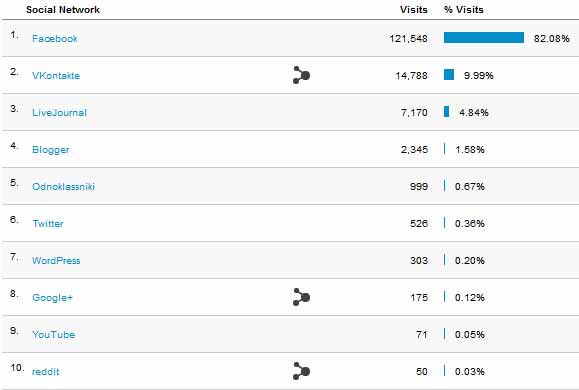
Thus RISU readers are scattered around the world and they come to the content of our portal, and, above all, they are interested in news. This is also confirmed by data from the most popular website among Ukrainian websites – Bigmir Ranking.
Challenges
The year 2012 was difficult for the RISU editorial office, primarily because of financial difficulties. As is generally known, we receive funds from grants and donations. Moreover, none of the religious organizations in Ukraine financially support our activities (for almost 12 years we received only three donations from two churches). Our main grant, which we receive from the NED Foundation, was significantly reduced in 2012, in particular, the foundation stopped financing the Russian and English versions of RISU. So we had a dilemma: either close them or immediately seek other sources of funding. We were able to solve part of the problem, but due to limited funding the number of materials on these versions decreased. But this year we got evidence that the RISU reader wants to read our articles in English and Russian: the mentioned news about events in the UOC-MP was in Russian, and one of the most widely read news of the year was an article in English about the miraculous phenomenon in the Maniavskiy Monastery (5,000 visits in one day). So we cannot abandon these versions. Rather, we must further develop them.
However, due to the existing financing problems we had to review our editorial work and redistribute responsibilities.
The RISU staff continues to seek alternative sources of funding and develop new projects that might interest our readers.
We also hope that some of our readers will want to support our work. This can be done without leaving the RISU portal or on the Ukrainian Catholic University’s website by selecting RISU on the donations. For information about other ways to support RISU, you can contact the editorial office by telephone (+380 32) 240 9499 or email: [email protected]
Despite these difficulties, at the end of 2012 we announced that we are seeking more regional correspondents so that we can better inform about religious life in various regions of Ukraine. If necessary, we way may even open regional subportals.
RISU plans to increase the number of original material, to develop video journalism and podcasts, and fill the subportals of RISU. But this our readers will be able to see themselves.
Please take a survey on the activities of RISU.





